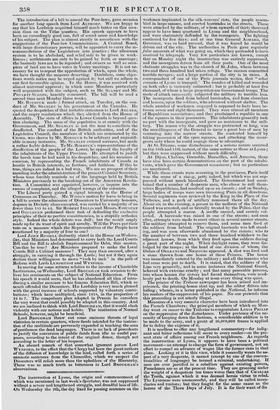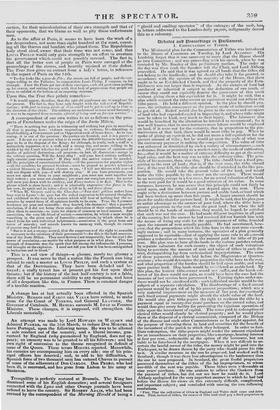The insurrection at Lyons, the origin and commencement of which
was mentioned in last week's Spectator, was not suppressed without a severe and lengthened struggle, and dreadful loss of life. On Wednesday the 9th, the day fixed for passing sentence on the workmen implicated in the silk-weavers' riots, the people assem- bled in large masses, and erected barricades in the streets. These were attacked by the military, of whom upwards of thirty thousand appear to have been quartered in Lyons and the neighbourhood, and were obstinately defended by the insurgents. The fighting continued for five days ; and at one time General AIMARD, the Governor, was so hard pressed, that it was feared he would be driven out of the city. The authorities in Paris gave regularly false accounts of what was going on, which they pretended to have received by telegraph. Very few particulars are known, except that on Monday night the insurrection was entirely suppressed, and the insurgents driven from all their posts. One of the most obstinate struggles was in the church of St. John, where between two and three hundred had taken refuge. The cannon committed terrible ravages ; and a large portion of the city is in ruins. A correspondent of one of the Paris journals wiites, that " what remains. of Lyons is tranquil." The number of killed and wounded on both sides is variously estimated ; but is probably at least five thousand, of whom a large proportion are Government troops. The mode of attack necessarily subjected the military to terrible loss, The insurgents fired from behind barricades, and from churches and houses, upon the soldiers, who advanced without shelter. The whole number of workmen engaged is supposed to hate been be- tween seven and eight thousand. They were almost all members of Republican associations; and they proclaimed a republic in one of the squares in their possession. The inhabitants generally took no part with the insurgents, and gave no assistance to the mili- tary. The reason why the struggle was protracted so long, was the unwillingness of the General to incur a great loss of men by venturing into the narrow streets. He contented himself by taking possession of the open squares, and attacking the insur- gents only where he could engage them to advantage.
At St. Etienne, some disturbances of a serious nature occurred on the 10th and 11th instant, of the same nature as those at Lyons; but they were suppressed without much difficulty.
At Dijon, Chalons, Grenoble, Marseilles, and Auxerre, there have also been certain demonstrations on the part of the inhales tants, which gave the Government uneasiness; but no particulars are mentioned.
While these events were occurring in the provinces, Paris itself was the scene of a rising, petty indeed, but which was not sup- pressed without much bloodshed. The Government had ascer- tained that a number of desperate men, who chose to call them- selves Republicans, had resolved upon an enieute ; and on Sunday, large bodies of troops were seen traversing Paris in all directions. Several regiments were reviewed by the King in the Place of the Tuileries, and a park of artillery remained there all the day. About six in the evening, a person in the uniform of the National Guard was arrested, and so brutally treated by the Police, that the people attempted a rescue. A scuttle ensued, and crowds col- lected. A barricade was raised in one of the streets; and soon after, attempts were made to erect others in several narrow streets. The military attempted to remove them, and some men fired at the soldiers from behind. The original barricade was left stand- ing, and was soon afterwards abandoned by the rioters ; who to the number of between two and three hundred withdrew to the adjacent houses, from which they fired upon the soldiers during a great part of the night. When daylight came, they were dis- lodged by the troops; at the head of one division of whom, the Dukes of ORLEANS and NEMOURS appeared. A shot was fired and a stone thrown from one house at these Princes. The house was immediately entered by the military ; and all the inmates who had arms were put to death. It is stated, that the soldiers of the Line very generally, and in some instances the National Guard, behaved with extreme cruelty ; and that many peaceable persons, into whose houses the rioters had forced themselves, were need- lessly put to death. On Monday at noon every thing was quiet. The printer of the Tribune newspaper has been seized and im- prisoned, the printing-house shut up, and the editor driven into hiding; whence, in a letter published in the National, he informs his readers of the suppression of his paper. No one pretends that this proceeding is not utterly illegal. Measures of a very coercive character have been introduced into the French Chambers; the principal members of which on Mon- day went en masse to the Tuileries to congratulate Louis PHILIP on the suppression of the disturbance. Under pretence of the ne- cessity of keeping down the factious, a considerable addition is to be made to the army, and a grant of 36,000,000 francs is applied for to defray the expense of it. It is needless to offer any lengthened commentary—for indig- nant and bitter reflections will occur to every reader—on the pre- sent state of affairs among our French neighbours. As regards the insurrection at Lyons, it appears to have been a political movement—an attempt to change the form of government, not an. effort to compel an advance of wages like the former riots in that place. Looking at it in this view, while it assuredly wears the as- pect of a very desperate, it cannot (except by one of the conven- tionalities of language) be termed a criminal, undertaking. If men are ever justified in a rebellion against existing powers, Frenchmen are so at the present time. They are groaning under the weight of a despotism ten times worse than that of CHARLES the Tenth, against which it was deemed heroic virtue to rebel. The Lyonnese were unsuccessful, and they will be called incen- diaries and traitors; but they fought for the same cause as the heroes of the Three Days of July. It is for their want of dis
cretion, for their miscalculation of their owa strength and that of their opponents, that we blame as well as pity these unfortunate men.
As to the affair at Paris, it seems to have been the work of a few desperadoes, not more than eight hundred at the most, count- ing all the thieves and banditti who joined them. The Republican body stood aloof, aware that their time was not come, and that Louis PHILIP would only gain strength by an effort to overturn his government which could not possibly succeed. The fact is, that all the better sort of people in Paris were enraged at the proceedings of the rioters, and heartily rejoiced at their defeat. The True Sun gives an extract from a lady's letter, in reference to the aspect of Paris on the 14th.
" To-day looks like a jour d e rte ; the streets are full of people, and the car- riages rolling to the Tuileries, to congratulate Louis Philip, I suppose, on his triumph. I saw the Peers get out of their carriages, each old gene eman pulling up his cravat, and settling his wig with that look of preparation that people are given to exhibit at the bottom of an imposing staircase."
Upon this, the True Sun pithily remarks- " It would appear, therefore, that the said old gentlemen are triumphant for the present. The fact is, they have only fought with the tail-end of Repot:Ili. canism ; with just so many joints of it as eoidd not he got to coil up in tune at the direction of the chiefs. The soldiery are understood to have acted furiously ; as was to be expected from recruits, afraid of bring sent on foreign service."
A correspondent of our own writes to us as follows on the pros- pects of Frenchmen under the reign of the Juste Milieu.
" There is nothing but pain in witnessing and nothing but pain in recording all that is passing here: violence responding to violence, blaudshedding to bloodshedding, a Government and an Opposition each of brute force. As to rea- soning, it is out of the question : the parties are frenzied, and it is a guerre snort. I do not see at present what is to resist the 400,000 bayonets which ap- pear to be at the disposal of the King; for although, in truth, such a staff is a melancholy supporter, it is a staff, and a strong one, and seems willing to be wielded by the Court whether for good or evil. All questions of opinion—a11 shades of political distinction—all progress—in fact, all discussion—merge in the solitary question, Will the Army obey ? will your hired soldiery uuflinch - ingly execute your commands? If they will; the matter cannot be mended. All the principles of constitutional liberty—all the guarantees for popular rights —all the securities for personal freedom—must lie ground to powder whenever a violent Monarch or Minister chooses to say, ' I will not discuss with you—I will not dispute with you-1 will destroy you.' If you have grievances, you must not speak of them to your neighbour ; you must not meet together for their redress ; you must not combine ; you must not complain even ; for power will mow you down with its artillery, and Force resters a la La. This is the phrase which is alone heard ; and it is admirably expressive—for force is the law now, its spirit and its letter force is left to it, and force alone. "When M. Gurzor said in the Chamber—' Fear not ! pitiless orders have been sent to Lyons '—he gave but the naked expression to his natural thoughts, and exhibited to the very life a system which will hear of nothing but the re • pression by armed force of all opinions hostile to its own. True, the Lyonnese workmen are poor and miserable: they fancied, idle dreamers! that a popular revolution, if it did not bring them some alleviation of their condition, would allow them to associate—to unite for objects of common or local interest. But association, the very life-blood of society—association, by which a man weighs something in the great scale of humanity—association, by which alone he is raised from his own individual helplessness—associ ition is the great bane and terror of misrule; and misrule knows its mean ng well, though its excess of passion may lead it astray. " But is it not a strange avowal, that the suppression of the right to assemble is necessary to the existence of their government ?—for this is the bold assevera- tion of the Juste Milieu. They must destroy (not temporarily, but for ever) the power of associating—no matter for what purpose or in what place. This last triumph of despotism was the spark that fell among the inflammable Lyonnese, and brought on the explosion. I need not tell you how it has been extinguished in barbarism and in blood."
This is a sad view of things—a gloomy, surely too gloomy a prospect. It can never be that a nation like the French can long submit to such a master as Louis PHILIP, and such a system as that of the Doctrinaires. They have been deluded and be- trayed; a crafty tyrant has at present got his foot upon their throats ; but if the history of the last half century is not a fable, there will be no permanent stability to any despotism, and least of all a despotism like this, in France. There is constant danger of a terrible reaction.





















 Previous page
Previous page